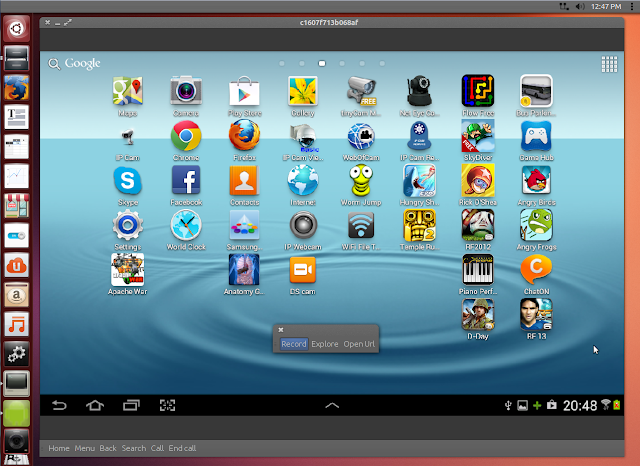Friday, May 31, 2013
Linux Mint 15
Clement Lefebvre has announced the final release of Linux Mint 15, code name "Olivia": "The team is proud to announce the release of Linux Mint 15 'Olivia'. Linux Mint 15 is the most ambitious release since the start of the project. MATE 1.6 is greatly improved and Cinnamon 1.8 offers a ton of new features, including a screensaver and a unified control center. The login screen can now be themed in HTML 5 and two new tools, 'Software Sources' and 'Driver Manager', make their first appearance in Linux Mint. MDM now features 3 greeters (i.e. login screen applications): a GTK+ greeter, a themeable GDM greeter for which hundreds of themes are available, and a brand-new HTML greeter, also themeable which supports a new generation of animated and interactive themes." Read the brief release announcement and also the what's new page and release notes for further details. Download (SHA256): linuxmint-15-mate-dvd-64bit.iso (1,000MB, torrent), linuxmint-15-cinnamon-dvd-64bit.iso (915MB, torrent).
Etichete:
Linux,
Linux Mint
Tuesday, May 28, 2013
Fedora 19 Beta
Dennis Gilmore has announced the availability of the beta release of Fedora 19: "We've opened the box for the Fedora 19 'Schrödinger's Cat' beta release and confirmed it's alive! Ready to purr at the latest free and open source technology?" Some of the features include: "3D modelling and printing are enabled through a variety of tools, including OpenSCAD, Skeinforge, SFACT, Printrun, and RepetierHost; OpenShift Origin; Ruby 2.0.0; MariaDB, a community-developed fork of MySQL; Federated VoIP; Developer's Assistant; Syslinux optional boot tool integration; systemd Resource Control; GNOME 3.8, KDE 4.10, MATE 1.6...." Continue to the release announcement for further information. Download links (SHA256): Fedora-Live-Desktop-x86_64-19-Beta-1.iso (951MB, torrent), Fedora-Live-KDE-x86_64-19-Beta-1.iso (888MB, torrent), Fedora-Live-LXDE-x86_64-19-Beta-1.iso (712MB, torrent), Fedora-Live-MATE-Compiz-x86_64-19-Beta-1.iso (693MB, torrent), Fedora-Live-XFCE-x86_64-19-Beta-1.iso (630MB, torrent).
Friday, May 24, 2013
SuperX 2.0
Wrishiraj Kaushik has announced the release of SuperX 2.0, an Ubuntu-based desktop Linux distribution with KDE 4.10.2: "This is SuperX 2.0, code-named 'Darwin'. It comes with Linux kernel 3.2 and KDE 4.10.2 by default. For those who want newer kernels, they are available in the repository. SuperX 2.0 is a whole new release of SuperX which differs fundamentally from the 1.x releases. Starting from SuperX 2.0 we are going our own way, making a diversion from our upstream distribution. We still use the Ubuntu code base but from this release we only use the LTS versions and development is done on its solid foundation. But unlike other solid, stability-concerned Linux operating systems, we provide the latest userland software like LibreOffice 4 and KDE 4.10. Starting from Darwin, we are keeping our core stable but will provide latest and greatest applications." Read the rest of the release announcement for more information, screenshots and known issues. Download (MD5): SuperX_2.0_Darwin_64-bit.iso (1,287MB).
KANOTIX 2013 "LinuxTag"
Directly from the LinuxTag 2013 conference and exhibition in Berlin comes a new version of KANOTIX, a Debian-based distribution (with KDE or LXDE) on a live DVD: "I am proud to announce the release of KANOTIX Dragonfire from LinuxTag 2013 in Berlin. Kanotix Dragonfire is based on the recently released Debian 7.0. Besides KDE as the default desktop environment, beginning with this release there exists a lightweight alternative with LXDE. Additionally, we offer a special image similar to the CeBIT special. The main difference is that it has a pre-installed Steam client, a newer MESA version (9.1.1), gfxdetect and a newer glibc 2.17, KDE SC 4.8.4 and LXDE, Iceweasel 21.0, Linux kernel 3.9; LibreOffice 4.0.3...." Read the rest of the release announcement for more details. Download links: KANOTIX-LinuxTag2013-Dragonfire64-KDE.iso (1,240MB, MD5), Download: KANOTIX-LinuxTag2013-Dragonfire64-KDE-special.iso (1,240MB, MD5), Download: KANOTIX-LinuxTag2013-Dragonfire64-LXDE.iso (1,319MB, MD5).
Thursday, May 23, 2013
BackBox Linux 3.05
Raffaele Forte has announced the release of BackBox Linux 3.05, an updated version of the project's Ubuntu-based specialist distribution designed for penetration testing and security assessments: "The BackBox team is pleased to announce the updated release of BackBox Linux, version 3.05. This release includes features such as Linux kernel 3.2, compat-wireless 3.8 (with Aircrack-ng patch) and Xfce 4.8. What's new? System improvements; upstream components bug corrections; performance boost; improved Update menu; improved Wi-Fi dirvers (compat-wireless 3.8 with Aircrack-NG patch); full support for Linux kernel 3.5 and 3.8 (install it with apt-get or Synaptic); predisposition to ARM architecture (new armhf.iso coming soon); new and updated hacking tools (Automater, inundator, Ettercap, Wireshark, SE Toolkit, Metasploit, sqlmap, BeEF, Recon-ng, zaproxy, Weevely, THC-IPV6, truecrack, Hashcat)." Here is the full release announcement with system requirements. Download (MD5): backbox-3.05-amd64.iso (1,587MB, torrent).
How to Record Your Android Device's Screen From Ubuntu 13.04/12.10 and Linux Mint 15/14
In this tutorial, we will see how to record your Android device's screen using a simple Java application called androidscreencast, you can get more information about it here.
The tutorial is workable in the following Ubuntu/Linux Mint distributions:
- Ubuntu 13.04/12.10/12.04 or older
- Linux Mint 15/14/13 or older
Let's first install some dependencies needed for the application to run properly. So, open the terminal and enter this command:
sudo apt-get install openjdk-7-jre android-tools-adb icedtea-netx
Connect now your Android device (Tablet/smartphone) via USB and run this command to make sure it is detected:
adb devices
You may see outputs similar to these if device detected:
List of devices attached
c1607f713b068af device
Now install androidscreencast using these commands:
mkdir -p ~/Android_Screencast && cd Android_Screencast
wget http://goo.gl/LMbQb -O androidscreencast.jnlp
Start the application with this command:
javaws ~/Android_Screencast/androidscreencast.jnlp
Wait for a a few seconds, then your Android device screen will appear on your computer:
You can resize the application window to increase the screen resolution of your Android device's screen. Click the Record button to start video recording.
Subscribe to:
Posts (Atom)








